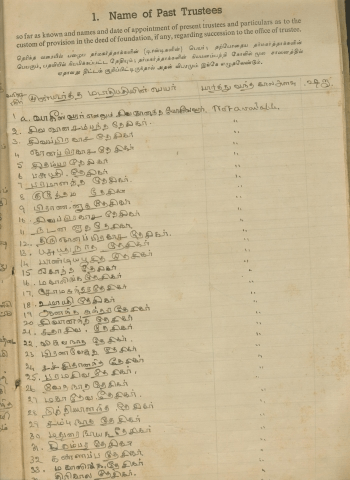



Translation of essential declarations of the Mother document and the glorious adherence to it during the revival era of the SPH
Name of the institution – Sri Tiru Jnanasambandar Swamigal Aadheenam
During the reign of King Koon Pandiyan, the Tamil saint and Nayanmar (enlightened devotee of Paramasiva) called Tiru Jnanasambandar incarnated in the Chola kingdom, in the town of Sirkazhi. He attained enlightenment at the age of 3 through the Grace of Devi Adishakti (Divine feminine consciousness) Herself. He also sang the devotional Tamil verses called ‘Thevaaram’ in praise of Paramasiva, and received several gifts from Him as a blessing. Endowed with many mystical spiritual powers, Tiru Jnanasambandar also visited many temples dedicated to Paramasiva to manifest these spiritual powers for the people of the kingdom. He reached the Pandya kingdom. There, he healed the severe fever and bent back of King Koon Pandiyan. The King was thereafter called Sundara Pandyan (meaning handsome Pandya).
GLORIOUS ADHERENCE TO THE ABOVE DURING THE REVIVAL ERA OF SPH
When His Divine Holiness assumed the Seat of Pontiff, as Paramasiva Himself, He initiated all the followers into spiritual power manifestation by awakening their Kundalini energy (inner potential energy of enlightenment) and their Third Eye (energy center located between the eyebrows) and like Tiru Jnanasambandar, all the people of the kingdom started manifesting various spiritual powers of healing, body scanning, remote vision and much more.
Particulars of the scheme of administration
The administration is happening under the person who comes as pontiff of the Madurai Tiru Jnanasambanda Swamigal Aadheenam.
Appointment method of Pandya Kingdom
The person who comes as Pontiff, in his period has to initiate the Thondaimandala Saiva Vellalar people and disciples of the Tiru Jnanasambandar mutt into Samaya and Vishesha deekshas as per the Agama.
GLORIOUS ADHERENCE TO ABOVE DURING THE REVIVAL ERA OF SPH:
His Divine Holiness, maintains 100% integrity to the above declaration of the Mother document. Till date He periodically initiates not only all the people but also all living creatures including animals into the samaya deeksha and visesha deeksha (formal initiations into the Adi Shaiva fold) as per the mandate of Paramasiva.
Particulars of important customs and usages
Nithya Pūjā (everyday worship) is a must to go on in the Aadheenam as per Kāmikā Āgama and Somasambhupaddathi (Sacred Source texts spoken by Paramasiva). Once if a person receives Ācārya Abhiśekam (coronation ceremony) in a particular period, it is irrevocable and none other can replace him as Pontiff.
Documented protocols for respect to be accorded to the ruling Pontiff
In all the ancient Hindu kingdoms, the Pontiff is the direct representative of the deity (Paramasiva) and the regent King and all the subjects bow down to Him, offering him supreme respect, and training in the Dharma (Cosmic Principles) at his feet.
There are detailed protocols documented on how the subjects shall relate with the ruling Pontiff, a few of which are mentioned here:
- When one writes a letter to the Pontiff, one should commence as follows: For the divine attention of Tirupperuntiru Guru Maha Sannidanam (Pontiff), herewith I, your humble devotee (name) am facing the direction of the Aadheenam, sitting on my knees (as a mark of respect) and writing this letter. By the divine blessings of the Lord and special blessing of Guru Maha Sannidanam (yourself), myself, my wife, my children and my relatives are all keeping well. We are awaiting to hear of the Sannidanam’s (Pontiff) good health and have his direct darshan (visit).
- When meeting the Pontiff at Odukkam, the meeting room, one must prostrate at his feet and receive the sacred ash from him and then be seated with men on his right and women on his left.
- One must not prepare to leave on one’s own during the meeting with the Pontiff. The Pontiff will grant leave at the appropriate time. Then one must prostrate before him and utter the word ‘uthiravu’ meaning “respectful adherence to his word”, and then leave facing him and walking backwards towards the exit, instead of turning one’s back on him disrespectfully.
- One must participate and offer seva (service) at the 5-day “Tiru Jnanasambandar Guru Puja festival”.
- When the Pontiff visits neighboring regions, the people there must gather at the entry to the region, accord him all respects, welcome him, and take him into the region. Similarly when he leaves, the people must accompany him upto the border and ceremoniously bid him farewell.
- During public functions where the Pontiff is invited, the organisers of the function must arrange for the people to assemble in separate lines of men and women and receive sacred ash and blessings from the Pontiff.
